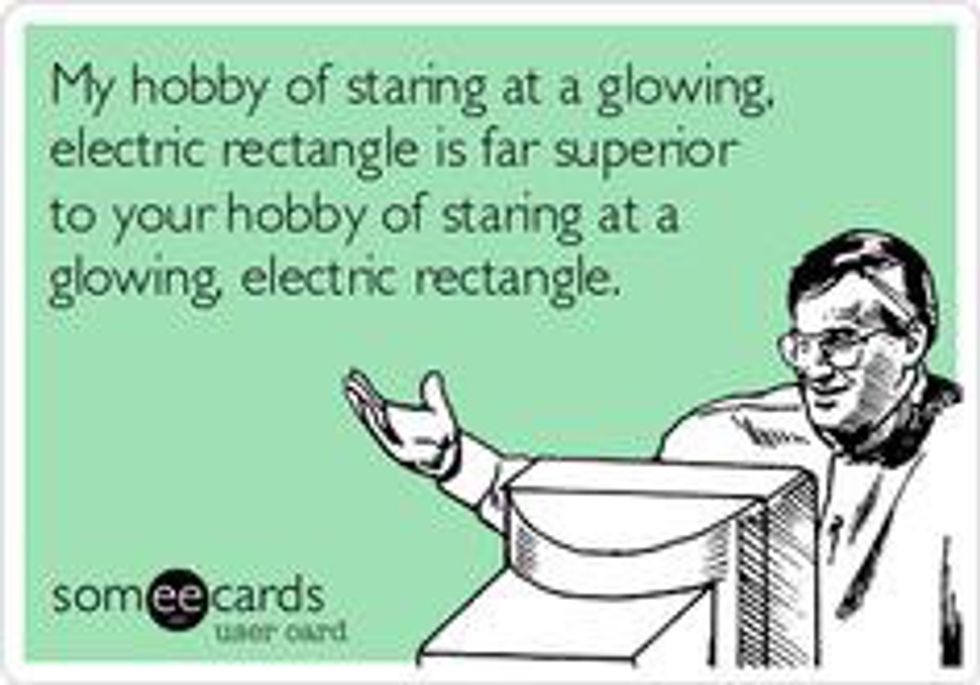I enjoy video games. To different people that can mean a lot of different things. To gamers of all kinds, it can mean PC gaming, consoles, enjoying classics or even just having a hobby of playing from time to time (and the different groups often like to let you know which group they fall into --#PCMasterRace). The idea of gaming is well-known and any gamer can respect a passion for gaming in any capacity. It's the non-gamers that have such a problem with the idea of enjoying these virtual fancies.
I have no clue why video games have such a bad reputation, but I can only assume it is due to the same reason any group develops one: rumors and a few extreme examples of nerdy gamers going viral. For whatever reason, people seem to almost universally frown upon the idea of spending one's time engrossed in a game when they could be doing literally anything else. Somewhere along the way the activity became something to be ridiculed if one publicly discusses the hobby among non-gamers. While this behavior could be for any number of reasons, it is more than likely stemming from the stereotypes that gamers are antisocial, lonelier, nerdy teenagers. Even older gamers get lumped into that stereotype with the only difference being that they act like a teenager instead of actually being one.
Regardless of whether or not gaming is your thing, I'm sure you know what I'm talking about. When you think of a console gamer, you probably think of the popular console games ("Call of Duty," "Halo," "Battlefield," etc.) and the sorts of people who usually are known to play those games religiously (12-year-olds who all eat Doritos and claim to know your mother personally, among other things). If someone told you they love to play older games (classics) all the time, you'd probably think them to be nerdy or having no life. PC gamers often get stereotyped as the typical keyboard warriors and neckbeards who probably live in their parents' basement at age 30 and think they're smarter than everyone else. While some of these are wider stretches of the imagination, they aren't too far off on a few points. For instance, the console gamers have the issue of having games be designed to appeal to adolescents with simpler stories and loads of the sorts of violence that most kids aren't allowed to see anywhere else, so a lot of tweens and teens end up there and embrace the vulgar and oddities of internet language way too wholeheartedly.
Some might view this as a problem that gaming industries need to address, but they do put a rating on games for a reason (even if no one ever actually follows the rules and waits until they're old enough), but I'm not here to discuss how to fix that issue. I'm here to talk about the stereotyping.
This is where I might lose some people. Stereotyping by itself isn't always a bad thing. All a stereotype is is a simplified view (which is a simplified version of the actual definition in Webster). Things such as most Italians being good cooks or most African Americans being more athletic are examples of stereotypes that aren't so bad. It's when prejudices come about that issues develop. Prejudices have little to no reasonable founding, and are almost always presumptive and massive over-generalizations. These are what most people have toward the idea of gaming.
If someone spends their day off relaxing in a chair and watching TV, people know they are enjoying themselves and think nothing less of them for it. If they spend the day at a spa or at a sports game, the same logic applies. So why is it that if they spend the day playing a game, the newest "Call of Duty" for example, and they tell others this (like a parent or boss), it's met with a less-than-enthusiastic response, even though it is no less healthy than relaxing and it encourages mental growth and social interaction if online?
Likewise, collecting gaming memorabilia is viewed similarly. Going to see a baseball game is normal, but going to a stadium to watch the "League of Legends" World Cup is viewed as nerdy and a waste of time/money (even if it's cheaper and takes less time than a baseball game most times). If someone dresses up in their jersey and sports gear for their favorite soccer team, that's normal, but dressing up as your favorite character in a game is almost always considered cringy and awkward. Even watching a video game event is considered nerdy and odd, but watching a soccer cup or the Super Bowl is normal and fine.
On a positive note, gaming has picked up speed and is quickly growing in both popularity and social acceptance all over the globe. With any luck, people will be able to accept this hobby and maybe the "antisocial nerd" stereotype might not be so predominate. As these gamers get more and more vocal, the overwhelming number of people playing video games may one day cause it to be normal behavior, just like any physical games are. There's no need to think less of someone because of a hobby, preference, or anything else that brings them happiness (unless it's really bad or harms other people -- feel free to think less of those jerks). In the end, we're all just trying to be happy, and some people find their happiness in another world. A virtual world.










 The minimum wage is not a living wage.
StableDiffusion
The minimum wage is not a living wage.
StableDiffusion
 influential nations
StableDiffusion
influential nations
StableDiffusion












